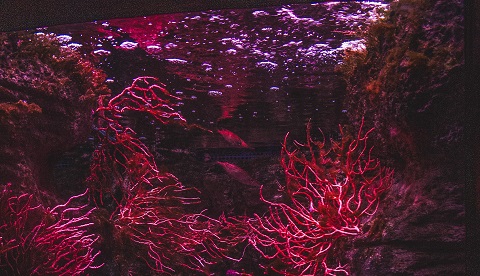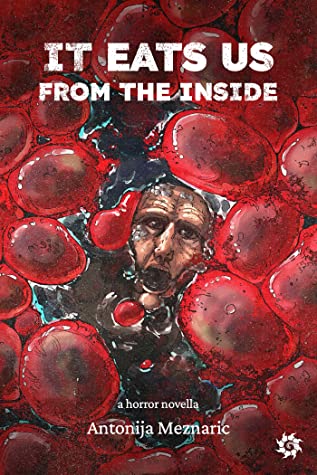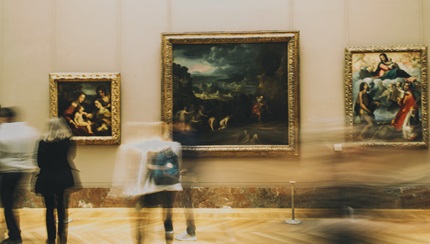
Book Spotlight | It Eats Us From The Inside by Antonija Mežnarić
Today the spotlight is on It Eats Us From The Inside by Antonija Mežnarić!
This claustrophobic, near-future, queer horror novella is the perfect pick for Pride Month. It deals with “ecological disaster, aquatic dread and Slavic folklore” where the changes come from the outside and from within. The book is out now in paperback and digital!
I’m sharing the official synopsis and excerpt below:

Genre: Aquatic Horror
Page Count: 143 pages
Publication Date: 23 June 2022
Author: Antonija Mežnarić
Publisher: Shtriga
Synopsis
The only reason Doris agreed to go back to her hometown on the Northern Adriatic coast was her wife’s insistence to go and visit her father, house-ridden and slowly dying from a mysterious illness that eats at him from the inside.
But under the surface of the family reunion lie old tales and hidden regret, while from the sea comes a creeping threat to the town and beyond, slowly but surely spreading farther from the coast.
Taken at the tide of change, nothing and no one will stay the same.
Excerpt
The pungent stench of the sea hit Doris in full force as soon as she got out of the safety of her air-conditioned car. Unprepared for it, her gag reflex kicked in, and she had to force her lunch to stay where it was, digesting in her stomach rather than splattering all over her. The smell was wrong, oily and heavy, with an unnatural acidic taste to it. It reminded her of the time she used to clean fish for lunch on the dock if that fish had already been rotten instead of freshly caught. The worst of it was that the small parking lot was situated on the waterfront which made it all the more inescapable and stronger. It even managed to distract her from the fact that, outside of the car, she was now exposed to the unforgiving blazing sun.
“Fuck, this is horrible,” she heard her wife say, by the passenger’s seat doors. Erika’s face was scrunched in distaste, locs hidden under the headscarf she’d fastened before getting out. “Do they know why it smells like that?”
“Have no idea, mom also didn’t know.” Doris had seen some of the reports, news, and panicked conspiracies on the social media hellscapes about this pollution, but didn’t expect it to be like this. Her most reliable source had been her mother, but she, also, didn’t live here anymore, so she couldn’t know how it actually was.
The very few docked boats lulled lazily on the surface, looking old and unkempt. The scarcity surprised her—though it shouldn’t have. She doubted anyone ever went out in them; what would be the point without edible fish or a chance to swim? To hop onto the closest island? The bald, rocky, brown side of the Pag island was just opposite the coast, its length parallel to the town, blocking the view at the horizon. But she wasn’t sure how far the toxicity had spread or even if there was anyone here who hadn’t already run away. There were apparently people living here still—she was here precisely because of one stubborn individual—not that she could understand that need, especially now, when she was inhaling the diseased sea into her lungs.
The view was also just… wrong. Instead of the beautiful stretch of aquamarine, there was something, right there, on the surface, but she couldn’t be sure what her eyes were seeing. Curious, she came closer to the edge of the parking lot and leaned towards the sea, murky with a dense layer of muck. It covered the sea from the shallows to the depths—almost as if someone had filled out plastic bags with a light red substance resembling diluted blood, and then tossed them overboard. Only, there were countless of these bags on the surface, an infinity of them, impossible for anyone to have created this sort of detritus. It must’ve been the bacteria doing something to the sea flora. The sourness permeating from it invaded her nostrils, tickling her palate with its foulness. The tuna sandwich she’d eaten on the trip was continually threatening with a comeback. She put the palm over her nose and mouth, but it was like trying to close down a disemboweling cut with a band-aid.
Doris moved away from the edge, suddenly worried she would lose balance and fall. In normal circumstances, that would’ve been the preferred outcome—once upon a time, she used to dive from here to cool out from the summer heat. After a full day on the road, she wanted nothing more than that sea of old, for her and Erika to strip off and go on a swim. This mucus-filled stinking soup didn’t have that same lure.
She turned her back to it, looking towards the town that had seen her growing up and becoming a teen, before her mother finally saw reason and took her away from it.
Karlobag stayed just as she had remembered it, with a row of small, sturdy houses along a road, growing like mushrooms up towards the mountain that loomed over the town with its spikes and curves. Velebit—a slumbering giant—tolerated Karlobag situated at the foot of its slopes.
Erika had already unloaded the car taking out their bags—not much, only two, and both small. Only one more car, besides theirs, was parked at the lot, alongside a black van with tinted windows. Doris went to the parking meter she remembered from her teens, with a small solar panel powering it. Its metallic blue was rusted over with time, rain, and salt. The display showed flickering broken lines, turning the words into unreadable gibberish. Only the word PLEASE was clear enough. It sounded desperate, pleading with Doris, and the discomfort crept over her.
“You know something is very, very wrong when the parking meter is broken during the summer season,” Erika said, looking at Doris’ attempts to get it to work. No matter how many times she tapped the touchscreen, it stayed a flickering mess, and when she checked her watch it didn’t show that it recognized new devices she could connect to. That part wasn’t that surprising; she’d left a long time ago and it was obvious they hadn’t changed the machine, updated it with the modern times.
“Yes, well, this was never a popular destination.” Doris looked over to the houses on the other side of the road, the first line of the town. It wasn’t a complete truth. While the town had lost a lot when the highway was built—a long time ago—connecting Croatia’s north and south but bypassing Karlobag completely, it was still on the coast and, as such, a tourist destination regardless. It had been especially popular with bikers since the old road, the Magistrala—which had been the first connective tissue of the north and south before the highway—was famous for its dangerous serpentines and beautiful views, marking Karlobag a special place to stop while on the road. There were also always a lot of people from towns on the other side of the mountain, who wanted to go to the beach over the weekend and this had been the closest spot. Or those who had families here and had inherited houses from dead relatives, though this group always lived somewhere else and only came here when on vacation. It just wasn’t that hot of a destination as some other coastal towns on the highway, or the islands. Like, for example, how its neighbor island Pag used to be—and probably still was—a true tourist trap, always choking on crowds and a rich nightlife.
“Well, if there’s anyone who still cares, they can fine us,” Doris said, giving up on the meter. She reached out and took Erika’s hand in hers, something she didn’t get to do when she used to live here. Like that, the two of them crossed the street. The first building they came across was the restaurant where her family used to come for pizza nights, now empty and closed, its terrace just a concrete spot, devoid of tables, chairs, and patrons. Houses had their windows closed, blinds firmly shut. Parts of Karlobag which were close to the coast were cramped, houses close to one another, the better to protect them when the strong northern wind came crashing from the mountain to the sea. It meant that, during the summers, it used to be impossible to walk the narrow cobbled paths without seeing someone’s living room; doors wide open, uncaring for strangers passing by. There had always been sounds following her—television turned on or people’s conversations—but now not a mouse could be heard. Only the steps the two of them made.
The town had that winter aura Doris was also used to. When it looked abandoned and dead—when all of the restaurants were closed and nothing operated except maybe two shops—but was only actually hibernating until spring, when it slowly started to wake up, waiting for the first guests to arrive.
Now, if she had to compare it to anything, it would be a patient in a coma, hooked to failing life support.
It wasn’t long before they trudged to the two-storey, ash-gray house, tall, long and unremarkable. Doris paused in front of the red door, her left hand grasping the bag strap over her shoulder, her right still holding Erika’s. She thought she was ready. After a flight and most of a day spent on the road and after weeks of discussion, first with her mother, then with her wife, it should’ve been much easier to knock on the door. This was the end of it all, the travel, the tired fights, the nausea-inducing uncertainty.
Yet, the cherry red door sounded the alarm in her mind. If they opened, it wouldn’t be the end. It would be the beginning of something she wasn’t sure she wanted to have any role in.
Excerpted from It Eats Us From The Inside © 2022 by Antonija Mežnarić. All rights reserved.
Cover photo by Diane Picchiottino






